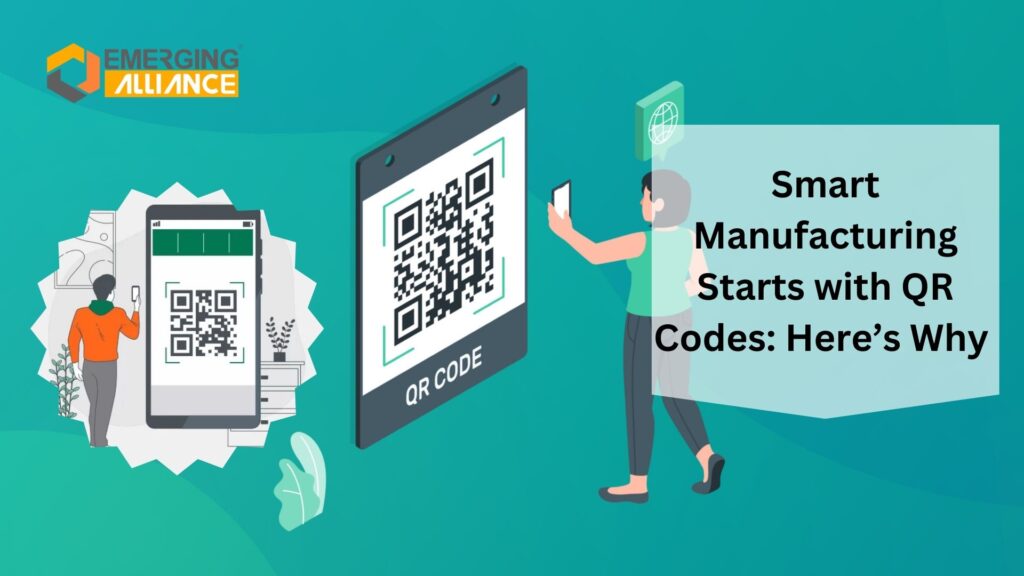
Smart Manufacturing Starts with QR Code: Here’s Why

Why QR Codes Are Essential for Today’s Manufacturing Industry
QR codes and barcodes are more than just tools for scanning in retail—they are transforming the way industries operate, particularly in manufacturing. With the ability to track, trace, and manage products and resources with ease, QR code are making a significant impact across various manufacturing processes. From inventory management to customer service, this technology is helping businesses streamline operations, reduce errors, and improve efficiency. In this blog post, we’ll explore where QR codes and barcodes are being used in the manufacturing industry to create a substantial difference.
1. Inventory Management
QR codes are a game-changer in inventory management. By embedding a QR code on each raw material or finished product, manufacturers can efficiently track their inventory in real time.
- Raw Material Tracking: QR codes help businesses track raw materials from the moment they enter the production process. This ensures accurate inventory records, reduces waste, and avoids production delays due to material shortages.
- Finished Goods Inventory: Finished goods can be tagged with QR codes that allow warehouse staff to quickly identify and track product quantities, manage storage locations, and simplify the process of stock taking.
2. Supply Chain Management
Supply chain management is another area where QR codes have a profound impact. Whether it’s inbound or outbound logistics, QR codes are transforming the way products move through the supply chain.
- Inbound Logistics: Manufacturers can scan QR codes on shipments to quickly verify contents, track deliveries, and maintain accurate records of goods entering the warehouse.
- Outbound Logistics: For outbound shipments, QR codes make it easy to track the movement of finished goods and their route to customers, improving order accuracy and reducing delivery errors.

3. Production Management
Production management relies heavily on accurate tracking and the efficient flow of materials. QR codes can be used at every stage to ensure the right materials and resources are available at the right time.
- Work-in-Progress Tracking: QR codes allow manufacturers to track work-in-progress items at various stages of the production process. This helps to identify bottlenecks, ensure deadlines are met, and reduce downtime.
- Material Issue/Receipt: By scanning QR codes when materials are issued to or received from the production floor, businesses can ensure proper documentation and maintain accurate inventory levels.
- Equipment Maintenance: QR codes can be used to monitor and track maintenance schedules for machines and equipment. By attaching a QR code to equipment, manufacturers can easily access maintenance history, service dates, and issue reports, which helps prolong equipment life and reduce downtime.
4. Production Planning and Scheduling
Effective production planning and scheduling are essential to meeting demand and optimizing resources. QR codes play a crucial role in streamlining these processes.
- Job Cards: Job cards, which detail the tasks for each worker or machine, can be encoded into QR codes. This enables quick access to instructions, reducing the chances of errors and increasing productivity.
- Resource Allocation: Manufacturers can use QR codes to manage and allocate resources—whether it’s human labor, raw materials, or machinery. This ensures that the right resources are available when needed, minimizing delays and waste.
5. Quality Control
Maintaining high-quality standards is a top priority in manufacturing. QR codes help manufacturers improve quality control by enabling real-time tracking of inspections and defect management.
- Inspection Tracking: Quality control teams can scan QR codes to track the inspection process of products at various stages of production, ensuring compliance with industry standards.
- Defect Tracking: If defects are found, QR codes provide a fast way to document and track the issue. Manufacturers can pinpoint the exact location and cause of defects, allowing for swift corrective action.
6. Warehouse Management using QR Code
Effective warehouse management is essential for keeping a manufacturing operation running smoothly. QR codes make it easier to organize and track products in the warehouse, leading to greater accuracy and efficiency.
- Location Management: QR codes can be used to tag storage locations, allowing warehouse personnel to quickly find and retrieve products. This eliminates errors related to misplaced inventory and optimizes warehouse space.
- Stock Taking and Transfer: Performing stock counts is simplified with QR codes, as staff can scan products and update inventory in real time. Similarly, stock transfers between locations within the warehouse can be quickly documented via QR scanning.
7. Product Traceability
For manufacturers who need to track the journey of their products through various stages, QR codes are invaluable tools for enhancing product traceability.
- Batch and Lot Tracking: By using QR codes, manufacturers can track products by batch or lot number, helping ensure quality standards are maintained throughout production.
- Serialization: Serialization, or the process of assigning a unique identifier to each product, can be easily achieved with QR codes. This improves traceability, particularly in industries like pharmaceuticals or food production where regulatory compliance is crucial.
- Warranty Registration: QR codes on products can also link customers directly to warranty registration pages, making it easier for both customers and manufacturers to track warranty claims and service requests.
8. Customer Service
QR codes provide great value to customer service by allowing manufacturers to offer better after-sales support and feedback management.
- After-Sales Support: Customers can scan QR codes on their purchased products to quickly access support materials, user manuals, or troubleshooting guides.
- Feedback Collection: QR codes can be placed on products or packaging to encourage customers to provide feedback. This real-time customer input helps manufacturers improve their products and services.
9. Asset Management with QR Code and Barcodes
Effective asset management is essential in manufacturing, and QR codes simplify this process.
- Fixed Asset Tracking: By tagging assets like machinery, tools, and equipment with QR codes, manufacturers can track their location, usage, and maintenance history.
- Tool Management: QR codes can be used to track the usage and maintenance schedules of tools and instruments, ensuring they are always available and in optimal condition for production.
- Lab/Inspection Equipment Tracking & Calibration: Manufacturers can attach QR codes to lab and inspection equipment to track calibration schedules and usage, ensuring compliance with regulatory standards.
10. Document Management
QR codes are a great tool for managing and organizing documents, reducing the need for physical paperwork in manufacturing.
- Electronic Document Tagging: Important documents, such as quality certificates or compliance reports, can be tagged with QR codes. This allows employees to quickly retrieve them and verify critical information.
- Paperless Manufacturing: By converting work orders, bills of materials, and other production-related documents into QR codes, manufacturers can reduce paper usage and improve process efficiency.
- Product Information: QR codes can also be used to provide customers with instant access to detailed product information, reducing the need for printed manuals and labels.
QR codes and barcodes are revolutionizing the manufacturing industry by improving efficiency, accuracy, and traceability across all stages of the production process. From inventory management and supply chain logistics to quality control and asset tracking, QR codes are enabling manufacturers to operate smarter, faster, and more sustainably. By embracing this technology, manufacturers can gain a competitive edge in an increasingly complex and fast-paced global market. The future of manufacturing is undoubtedly barcode-driven!
FAQ – Answering Your Key Questions
What are QR codes and barcodes in manufacturing?
QR codes and barcodes are digital labels used to store and access data. In manufacturing, they help track materials, products, and equipment, making operations faster and more accurate.
How do QR codes help with inventory management?
QR codes let manufacturers track materials and products in real time, reducing mistakes and shortages. This helps keep inventory accurate and organized.
Can QR codes improve supply chain management?
Yes! QR codes help track shipments as they move through the supply chain, making deliveries more accurate and efficient.
How do QR codes assist with production management?
QR codes help track materials and products at each stage of production, ensuring everything flows smoothly and reducing downtime.
How do QR codes improve quality control?
QR codes make it easier to track inspections and product defects. This helps catch issues early and ensures products meet quality standards.
How are QR codes used for asset management?
QR codes are placed on equipment to track their location, usage, and maintenance. This helps ensure everything is in good condition and ready for use.
How do QR codes help with production planning and scheduling?
QR codes make it easy to access job details and schedules, ensuring workers have the right resources and can complete tasks on time.
How do QR codes improve product traceability?
QR codes allow manufacturers to track products by batch or serial number, making it easier to trace them through the production process.
Can QR codes help reduce paper in manufacturing?
Yes, QR codes replace paper documents by linking to digital files. This reduces paper waste and makes information easier to find.
Are QR codes secure for storing sensitive data?
QR codes can be secure if set up properly. They can safely store data, as long as the right security measures, like encryption, are used.
To know more about our products and services, visit us at: https://emerging-alliance.net/






